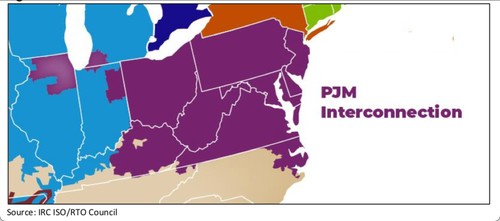America’s Largest Power Grid Faces Worsening Reliability Risks
A new report reveals the US’ largest power grid is shuttering power generation units faster than new supply can be brought online, threatening electric reliability in 13 states that stretch from Illinois to New Jersey with over 65 million customers.
PJM Interconnection published a new study Friday that examines the alarming trend of state and federal decarbonization policies across the grid that “present increasing reliability risks during the transition, due to a potential timing mismatch between resource retirements, load growth and the pace of new generation entry.”
Here are the key highlights of the report:
- The growth rate of electricity demand is likely to continue to increase from electrification coupled with the proliferation of high-demand data centers in the region.
- Thermal generators are retiring at a rapid pace due to government and private sector policies as well as economics.
- Retirements are at risk of outpacing the construction of new resources, due to a combination of industry forces, including siting and supply chain, whose long-term impacts are not fully known.
- PJM’s interconnection queue is composed primarily of intermittent and limited-duration resources. Given the operating characteristics of these resources, we need multiple megawatts of these resources to replace 1 MW of thermal generation.
The report warned:
“For the first time in recent history, PJM could face decreasing reserve margins should these trends continue.”
A significant problem with the ‘green transition’ is adding renewable power, such as solar and wind, are unreliable forms of power generation. Combining this with rapidly retiring fossil fuel power generation units will reduce generating capacity by about 21% through 2030. The report pointed out that the current pace of adding new power generation wouldn’t compensate for the retirement of coal- and natural gas-fired generation amid soaring demand.
Here’s the full report:
What’s clear is PJM’s grid is becoming less dependable (read: here & here) and will probably worsen in the transition to a decarbonized future.
